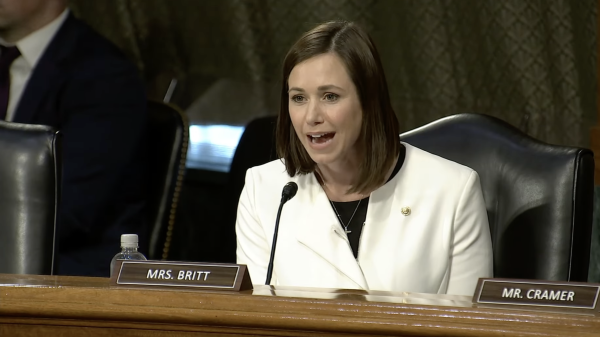|
Getting your Trinity Audio player ready...
|
Something stinks in Alabama’s medical marijuana licensing process.
I think I’ve said that before. But the skunk weed-like stench is overwhelming now. The smell wafted out of Montgomery Circuit Court Judge James Anderson’s courtroom on Monday afternoon, but it didn’t originate there.
The source is the Alabama Medical Cannabis Commission. More specifically, it is the flawed and absurd scoring process that the AMCC is strangely adamant about keeping in place.
Even after admitting publicly that it was filled with errors and miscalculations.
Even after agreeing, once pinned to the mat by cannabis companies that have filed lawsuits, to restarting the licensing process and giving all of the companies applying for integrated licenses another shot before the commission.
Despite all of that, the AMCC still wants to use those flawed scores collected by graders recruited by the University of South Alabama and approved by the AMCC. They’re fighting for it.
In Anderson’s courtroom on Monday, several companies asked the judge to toss those scores and forbid the AMCC from using them. The AMCC is adamant it must use them.
Why?
That’s the question, isn’t it? Why would the AMCC, which should have only the goal of selecting the best possible companies to receive the state’s first medical cannabis licenses, want to keep in place scores it has already admitted are flawed?
And make no mistake about it, these scores are flawed. Want some examples?
How about a company, Hornet Medicinals, which is 51 percent owned by Alabama State University – one of the oldest historically Black colleges in America – failing to receive minority applicant status? It also was dinged for “residency issues.” It’s only been in the state for 150 years.
Or how about the company from south Alabama that received a near perfect grade from one grader for its security plan, and then received a failing score from a second grader – an unexplainable difference?
Or how about the fact that some companies with fully operational facilities were given worse scores for facility plans than companies that haven’t even poured a foundation yet, and that have no hope of meeting the 60-day production deadline imposed in the law?
Or how about the fact that numerous companies’ scores were negatively impacted by a file-size limitation imposed by the AMCC but not strictly adhered to for all applicants?
Or how about that some applicants were dinged for background check issues when it was the AMCC that had problems viewing the paperwork?
These are the scores the AMCC is fighting tooth and nail to keep in place. Those scores are worthless, and everyone even remotely associated with this process knows it. Including the AMCC and its attorneys.
So, why are they fighting so hard to keep them?
During Monday’s hearing, one attorney, Bill Espy, told Anderson that a single deposition of a commissioner would reveal a corrupt process. Two sources familiar with the process told APR that the corruption in question deals with ties that certain current and former AMCC members had with applicant companies and investors/employees who stood to gain from the licensure process.
APR also has received documents showing that the AMCC (or at least individual members) was much more involved with the selection of graders than the Commission has previously stated. In fact, the Commission apparently had final approval of all graders and was involved in recruiting certain individuals to be graders, according to an email provided to APR.
Which would make it particularly easy to manipulate this process from start to finish.
Because if there’s one constant in life, it’s this: If something in a government process doesn’t make sense, figure out who’s getting paid.
The simple fact is the AMCC has failed spectacularly in this process, whether by design or by incompetence, or both.
The commissioners have failed to do the bare minimum of research into these companies. They’ve never visited the sites. They’ve never spoken with the companies’ leadership. They’ve barely reviewed even portions of their applications.
Instead, they have allowed the process to be hijacked and corrupted, and now we’re left with the current national embarrassment. The only solution here is to start over and actually do the job that the medical cannabis laws demand of the AMCC and the licensure process.
It’s the only way to get rid of the stench of corruption.



















































